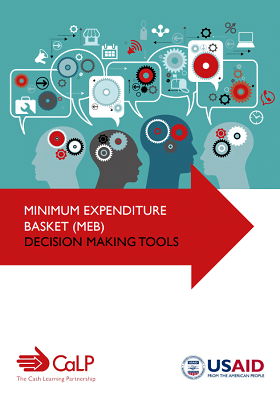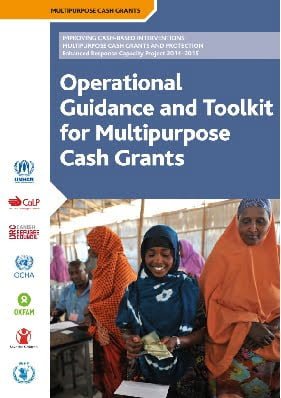المساعدات النقدية متعددة الأغراض
المساعدات النقدية متعددة الأغراض عبارة عن تحويلات نقدية غير مقيدة يمكن للأشخاص المتضررين من الأزمات استخدامها لتغطية احتياجاتهم الأساسية. بحكم طبيعتها، تعد المساعدات النقدية متعددة الأغراض طريقة المساعدة التي توفر للناس أقصى درجة من الاختيار والمرونة والكرامة. وهناك أيضًا أدلّة متزايدة على أن تلبية الاحتياجات المتعددة أكثر فعالية من حيث التكلفة وفعالية من حيث التكلفة.
لكن هذا يتطلب طرقًا جديدة للتعاون بين الجهات الفاعلة في المجال الإنساني، في جميع مراحل دورة البرنامج وبين القطاعات. على الرغم من وجود أدوات قوية لدعم التعاون، إلّا أنه لم يتم تبنيها على نطاق واسع ولا تزال المساعدات النقدية متعددة الأغراض مستخدمة بطريقة مخصصة. ولا تزال هناك تحديات يتعين مواجهتها إذا أردنا أن نلائم المساعدات النقدية متعددة الأغراض بنجاح في النظام الإنساني.
Featured content

Minimum Expenditure Basket (MEB) Decision Making Tools
Guidelines and Tools
Update: This publication was revised in 2022. Please read the revised publication here.
The purpose of this tipsheet is to accompany practitioners and decision makers through key stages in the process of calculating an MEB to: (a)
identify what is the most appropriate path to take in relation to their
particular context, identified objective, existing capacities and available
resources; and...

Operational Guidance and Toolkit for Multipurpose Cash Grants
Guidelines and Tools
This operational guidance and toolkit brings together worldwide expertise on cash-based interventions (CBIs). It provides comprehensive and practical guidance for humanitarian actors to assess the feasibility, conceptualise the design and structure the implementation of MPGs. The guidance focuses on MPGs whose primary objective is to meet basic needs as defined by affected people...

Definition of Minimum Expenditure Baskets (MEB) in West Africa
Report
Throughout 2017, five countries in West Africa have worked collectively to define minimum expenditure baskets, in order to better capture the contribution that humanitarian assistance is making to address the basic needs of affected populations, and improve the impact of assistance. This heavy process raises technical and coordination challenges. The CALP Network, with support from USAID /...
Thematic lead
Latest
لم يتم العثور على نتائج
لا يوجد محتوى متاح حالياً.



